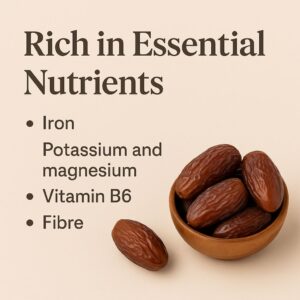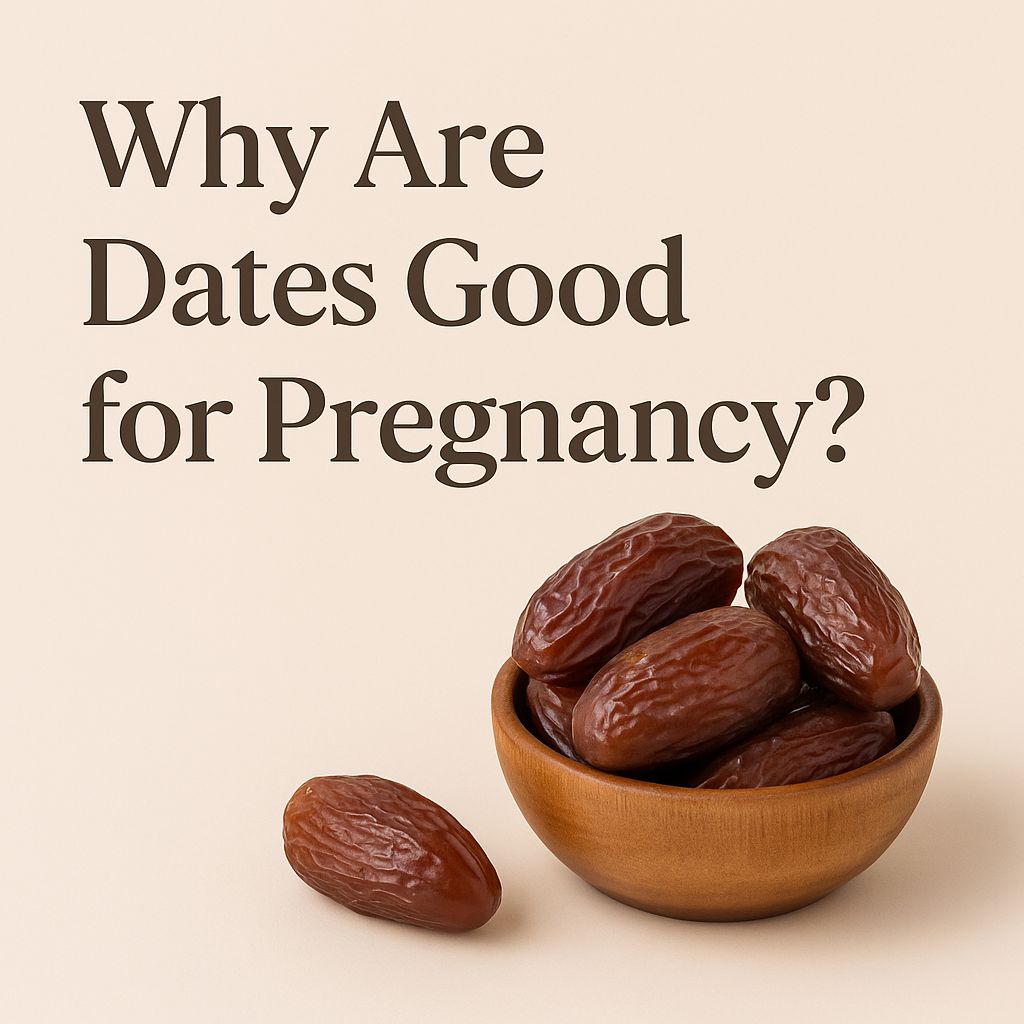Why Are Dates Good for Pregnancy? A Natural Boost for Moms-to-Be
Joy, expectation, and numerous dietary adjustments are all part of pregnancy. It is frequently recommended that expectant mothers consume wholesome, nutrient-dense foods that promote the growth of the unborn child as well as their own health. Dates are a superfood during pregnancy among the many nutrient-dense options available. Many cultures have been consuming these naturally sweet fruits for generations because of their amazing health advantages as well as their delightful taste. They are also full of fiber, vitamins, and minerals.
However, what makes dates suitable for pregnancy? This blog post will discuss the best ways to include dates in your diet, their labor-promoting properties, and the scientifically proven advantages of eating them throughout pregnancy.
What Are Dates?
The date palm tree, which is mostly planted in the Middle East, North Africa, and some regions of South Asia, bears dates as its fruit. They are renowned for their chewy texture and inherent sweetness and exist in a number of kinds, including Medjool, Deglet Noor, and Ajwa.
Dates are a nutritional powerhouse. Just a handful of them provides:
• Natural sugars (glucose, fructose, and sucrose)
• Dietary fiber
• Potassium
• Magnesium
• Iron
• Vitamin B6
• Antioxidants
These nutrients make dates an ideal snack, especially during pregnancy when energy and nutrition needs increase.
1. Natural Energy Booster
Fatigue is a common side effect of pregnancy, particularly during the first and third trimesters. Because dates contain a lot of carbohydrates, especially natural sugars, they are a great natural energy source. Dates, as opposed to refined sugar, provide a healthy energy boost without the crash, assisting expectant moms in maintaining their energy levels throughout the day.
Why it matters:
• Reduces the need for processed snacks
• Sustains energy without harming blood sugar levels when consumed in moderation
• Supports daily nutritional requirements
2. Rich in Essential Nutrients

Dates assist meet many of the vitamin and mineral requirements that are raised during pregnancy.
Iron
helps in preventing anemia, a common condition during pregnancy. Dates can supplement a diet high in iron since they contain small levels of iron.
Potassium and magnesium
are essential for maintaining healthy muscles, the heart, and lowering the chance of cramping, a frequent pregnant ailment.
Vitamin B6
helps lessen morning sickness and is crucial for brain development.
Fiber
helps with digestion and avoids constipation, which is another common problem pregnant women suffer.
3. May Help with Labor and Delivery
The potential for dates to facilitate labor and enhance delivery outcomes is among their most intriguing advantages throughout pregnancy.
According to a 2011 study that appeared in the Journal of Obstetrics and Gynecology, women who consumed six dates every day for the four weeks before their due date:
• Had a significantly higher chance of spontaneous labor
• Experienced shorter first stages of labor
• Were less likely to need labor induction or augmentation
Another 2017 review in The Journal of Midwifery and Reproductive Health supported these findings, highlighting that dates might improve cervical dilation and uterine contractions.
How does it work?
The hormone oxytocin, which promotes labor contractions, is mimicked by substances found in dates. They may have an impact on labor since they also aid in making the body more sensitive to oxytocin.
4. Helps Prevent Constipation
Hormonal changes during pregnancy can slow down the digestive system, leading to constipation. The high fiber content in dates (about 7 grams per 100 grams) promotes healthy digestion and regular bowel movements.
Eating a few dates daily can:
• Improve gut health
• Soften stools
• Prevent uncomfortable straining during bowel movements
Plus, fiber helps maintain healthy blood sugar levels, which is especially important for women with gestational diabetes.
5. Supports Fetal Development
Dates are a rich source of nutrients that contribute to the healthy growth and development of the baby.
• Folate (folic acid) is essential for preventing neural tube defects.
• Vitamin K helps in bone development and supports blood clotting.
• Magnesium plays a role in fetal bone and tissue formation.
By including dates in your pregnancy diet, you’re not only supporting your own body but also providing key nutrients for your growing baby.
6. Balances Hormones and Reduces Stress
Hormonal changes during pregnancy might cause emotional ups and downs. Tryptophan, an amino acid found in dates, increases the synthesis of the mood-stabilizing neurotransmitter serotonin.
A healthy pregnancy depends on the magnesium in dates, which also has a relaxing impact and may help lower stress, enhance sleep, and ease anxiety.
7. Aids in Postpartum Recovery
Dates continue to have advantages even after delivery. Their high energy level can aid in the physical recovery of new moms after giving birth. Additionally, by increasing prolactin levels, which are linked to the production of milk, dates may facilitate breastfeeding.
In many cultures, eating dates just after delivery is even advised to hasten healing and restore the body’s depleted nutrients.
How to Include Dates in Your Pregnancy Diet
Dates are nutrient-dense, but moderation is essential. During the third trimester, especially in the final month of pregnancy, try to get four to six dates every day. Depending on your needs and diet, you can eat them more freely earlier in pregnancy.
Here are some delicious ways to enjoy dates:
• Stuffed Dates: Fill with almonds, walnuts, or nut butter for a protein-rich snack.
• Smoothies: Blend dates into a banana or almond milk smoothie for natural sweetness.
• Date Energy Balls: Combine dates with oats, seeds, and cocoa powder for a quick bite.
• Baking: Add chopped dates to muffins, pancakes, or breads.
• Chutneys or Pastes: Mix dates with tamarind and spices for a tangy-sweet spread.
If you have gestational diabetes or are watching your blood sugar, consult your doctor or dietitian before adding dates to your routine.
#Are There Any Risks?

For most healthy pregnancies, dates are safe and beneficial. However, a few considerations:
• High calorie and sugar content: Although natural, dates are calorie-dense. Stick to recommended portions.
• Allergies: Rare but possible. Avoid if you’ve had allergic reactions to dates in the past.
• Consult with your doctor: Especially if you have any high-risk pregnancy conditions.
Final Thoughts: Nature’s Sweet Gift for Moms-to-Be
Dates are a nutrient-dense fruit with remarkable advantages for expectant mothers, making them more than just a sweet pleasure. Dates have earned their position in prenatal diet by promoting energy and digestion and may even facilitate childbirth.
Therefore, think about picking up some dates the next time you reach for a snack. Your baby and your body will appreciate it.
During your pregnancy, have you gone on any dates? Leave a comment below on your experience! Additionally, remember to share this post with other soon-to-be mothers if you found it useful.
